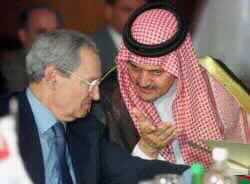Arab foreign ministers said they were sending a "unanimous" appeal to avert a war against Iraq at a time when US President George W. Bush sought to rally world support for military intervention. "We adopted unanimously a resolution concerning Iraq. We expressed our support to Iraq and we stood firmly against any attack on Iraq," Libyan Minister for African Unity Ali Triki told reporters as closed-door talks were ending. An Arab delegate who asked not to be identified said the final resolution would also call for "pursuing dialogue between Iraq and the UN secretary general in order to resolve questions linked to the return of (weapons) inspectors."
The inspectors fled four years ago ahead of a four-day US-British bombing blitz.
Reporters were still waiting for the release of a final written resolution at the headquarters of the 22-member Arab League, but Triki and his Egyptian, Sudanese and other colleagues said the meeting was unanimous in rejecting a war against Iraq.
Arab foreign ministers were wrapping up two days of talks dominated by Iraq but also focusing on how to end the Palestinian-Israeli conflict and Sudan's 19-year civil war.
The Arabs were joining opposition in many countries across the world against a war in Iraq, which came in sharp contrast to the broad Arab and international participation in the 1991 Gulf war to evict Iraq from Kuwait.
But the war drums have been beating for months as Bush has been calling for the overthrow of Saddam Hussein, whom he accuses of developing nuclear, chemical and biological weapons. Saddam categorically denies those charges.
Key US administration officials say the return of weapons inspectors would be futile.
UN resolutions adopted since Iraq's ill-fated 1990 invasion of its oil-rich neighbour, Kuwait, call for Baghdad to dismantle programs for nuclear, chemical and biological weapons in return for a lifting of the sanctions.
Some Arab delegates said Wednesday Iraq could only hope to avoid an attack by readmitting UN weapons inspectors, but it was not immediately clear if they had prepared or even discussed a statement concerning this.
Iraqi Foreign Minister Naji Sabri, meanwhile, said late Wednesday he was happy with the talks here. "The Arab position regarding American threats against Iraq is a united and positive position."
Sabri charged Wednesday that Bush will present "lies" in seeking the approval of the US Congress and United Nations for a strike against his country.
The Arabs opened their meeting on Wednesday with a call from Arab League Secretary General Amr Mussa for rapid action to avert a US military intervention against Iraq.
Mussa said a solution could only be found through a dialogue with the United Nations.
Such a dialogue would be aimed at getting Iraq to readmit arms inspectors who fled four years ago, and eventually at lifting 12 years of UN trade sanctions and ensuring Iraq remains whole, he added.
Sabri said Baghdad had received "assurances" from Russia and China, two permanent members of the UN Security Council he visited recently, "that they rejected an aggression against Iraq."
Moscow and Beijing "seek a political solution through a continuation of dialogue between Iraq and the United Nations," he said.
Earlier Wednesday, Bush pledged to seek Congressional approval for any military action to oust Saddam Hussein. He also said he would lay out his case in an address to the UN General Assembly next week, despite mounting concern that a US strike on Baghdad could destabilize the volatile Middle East region.
PHOTO CAPTION
Syrian Foreign Minister Farouq al-Sharaa, left, and his Saudi counterpart Saud al-Faisal, right, talk during a consultative meeting before the opening session of the Arab League in Cairo Wednesday Sept. 4, 2002. (AP Photo/Mohammad al S
- Author:
& News Agencies - Section:
WORLD HEADLINES


 Home
Home Discover Islam
Discover Islam Quran Recitations
Quran Recitations Lectures
Lectures
 Fatwa
Fatwa Articles
Articles Fiqh
Fiqh E-Books
E-Books Boys & Girls
Boys & Girls  Articles
Articles










